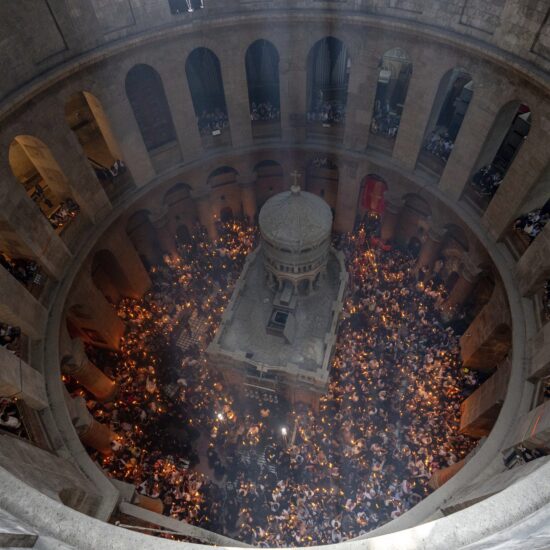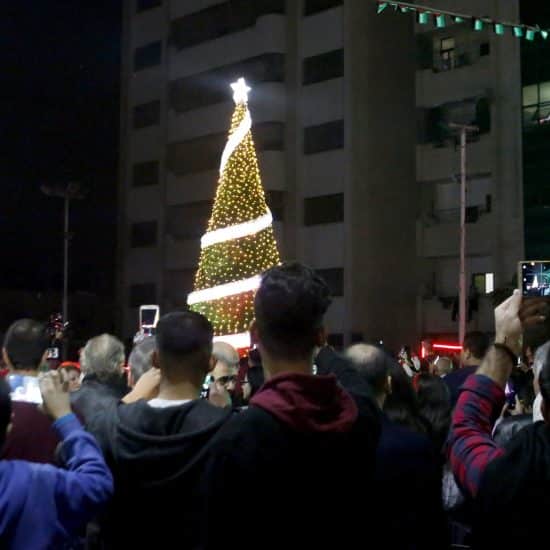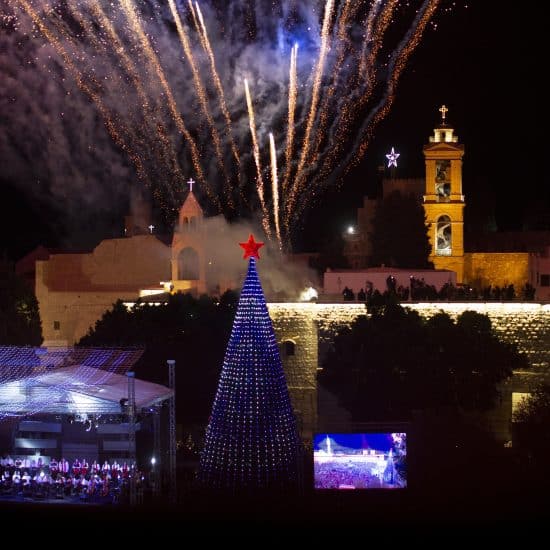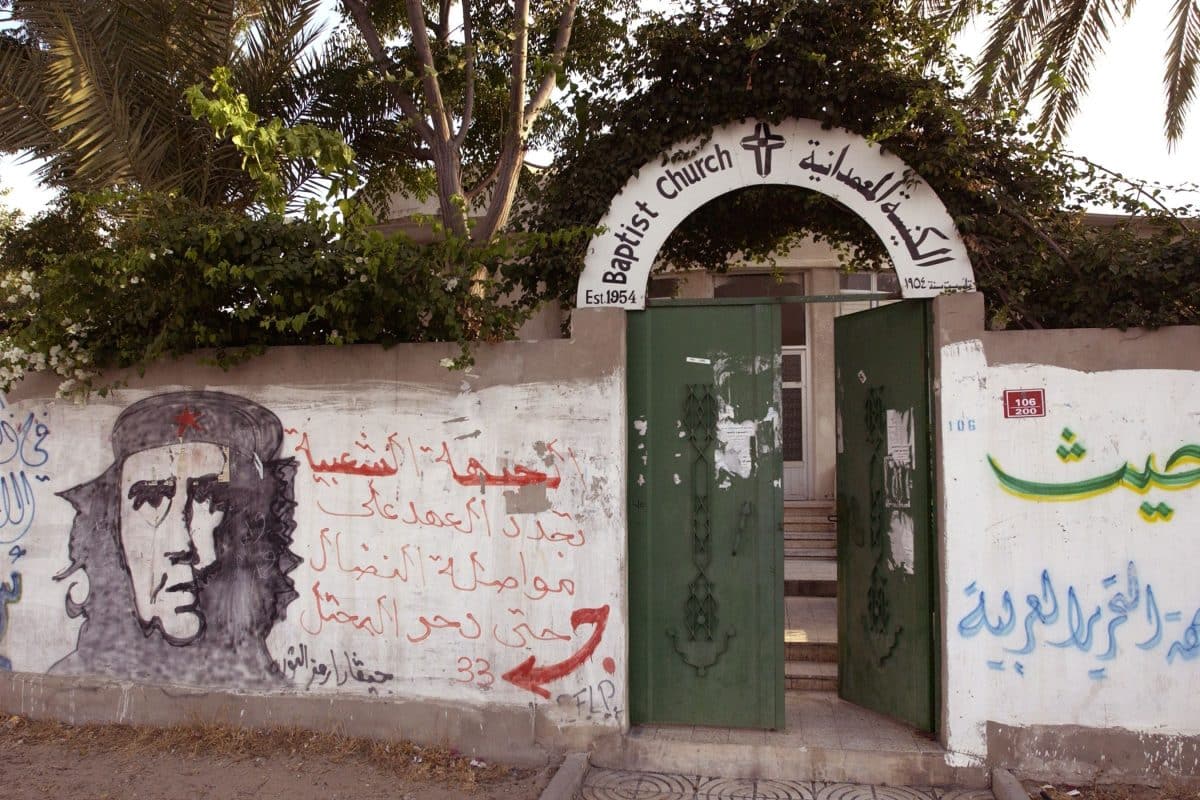
As the first cases of coronavirus appear in the Gaza Strip, humanitarian groups are raising alarms about the potential catastrophe that could emerge in one of the poorest and most-densely populated places in the world. A Baptist pastor who used to minister in Gaza is among those offering concerns as the global pandemic reaches a place lacking proper infrastructure or medical facilities.
As of March 30, more than 770,000 people globally have been infected with the COVID-19 respiratory disease caused by coronavirus, and more than 37,000 have died. In Palestine, which includes Gaza and the unconnected West Bank, 116 people have tested positive and one has died.
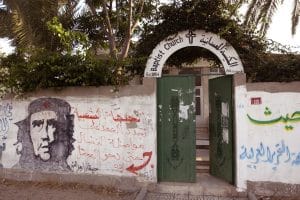
Outside wall of Gaza Baptist Church in 2002 photo. (Roy Burrows/Baptist Press)
Hanna Massad, a Baptist pastor who grew up in Gaza and pastored the only the Protestant church in the Gaza Strip, told Word&Way many people are concerned about the arrival and spread of coronavirus in Gaza.
“In Gaza, God forbid, if this coronavirus is spread — because it’s very crowded — it could be very difficult,” he added. “The hospitals and the medical health is limited, and they don’t have enough facilities to take care of the people. That would be really bad. So, we hope and pray that [coronavirus] would be very limited there.”
The first Palestinian case, which occurred in the city of Bethlehem in the West Bank, didn’t appear until March 4, nearly two months after the first case in the United States. Those cases led the Palestinian leaders to order lockdowns that impacted Christians in that biblical city, including Massad’s alma mater, Bethlehem Bible College.
The first two cases in Gaza were reported on March 22, and in the week that followed the number grew to nine. However, few of two million residents in Gaza have actually been tested. The first two cases involved individuals who returned home from Pakistan via Egypt, with the rest coming from people who interacted with the first two.
With both of Gaza’s borders — to Israel and Egypt — now closed except to allow Gazans to return home, those in Gaza are trapped in the 141-square-mile territory. About the size of Detroit, Michigan, or Las Vegas, Nevada — but with three times the population of those cities — Gaza is a place where social distancing remains difficult if not impossible as an average of 13,000 people live in each square mile.
Largely cut off from the outside world for 13 years, unemployment in Gaza was already at 52 percent and the poverty level at 50 percent before the global economic impact of coronavirus started. The area remains under an Israeli blockade that prevents many humanitarian and basic supplies from reaching territory. In addition to a lack of cleaning and protective medical supplies, there are only about 70 intensive care unit beds and only about 50 ventilators in all of Gaza — meaning the already inadequate health system cannot handle a large coronavirus outbreak.
Stuck in this dire situation — and also facing religious persecution — the small Christian community in Gaza includes the small Gaza Baptist Church, which was started in 1954 by Southern Baptist missionaries. The only other two Christian churches in Gaza are a Greek Orthodox congregation and a Catholic congregation. In all, the Christian population in the Palestinian Territories is only about 0.2 percent of the population, while about 99 percent of Gazans are Muslims.
Massad, who grew up in Gaza, converted to the Baptist faith from his family’s Greek Orthodox tradition. In 1987, he became the first local to pastor the Gaza Baptist Church, which had previously been led by visiting pastors from Egypt or Lebanon who usually only stayed a few years. He stayed for 30 years — except for an absence for seminary education in the U.S. — but left after violence in 2007 that included attacks on the church’s building and the kidnapping, beating, and murder of a youth worker at the church who also managed Gaza’s only Christian bookstore.
Today, Massad lives in the U.S. and runs Christian Mission to Gaza, an effort that involves frequent trips back to the Middle East as he works in Jordan, Israel, and the Palestinian Territories. He recounted life and ministry in Gaza in his 2018 book Pastor from Gaza.
When asked about the current coronavirus situation, Massad told Word&Way that for “the coming Sundays [the government will] not allow people to meet in churches” as part of an attempt to reduce mass gatherings that spread coronavirus. Complicating the situation for the Gaza Baptist Church, which he noted is “very small,” is “without a pastor” because the pastor from Egypt “left a few weeks ago.” Massad added before the suspension of services, a couple of lay persons were “leading the service” each Sunday night.
Massad also mentioned the situation in Jordan, where he had been until returning to the U.S. on March 15, cutting his trip off early because of the coronavirus outbreak and before he had a chance on that trip to visit Gaza. With 268 people testing positive and five dead, Jordan’s rate of infection in its population is nearly identical to that in Palestine.
Massad said his ministry partners with a Jordanian church to assist about 900 families and about 4,000 individuals — mostly Iraqi Christians — who are refugees in that country. Although they were able to hold church services when he was there in early March, he said that is no longer possible as churches “are not allowed to meet in Jordan” as part of the coronavirus restrictions.
According to the Baptist World Alliance, there are 22 Baptist churches in Jordan with just over 1,300 members. In all, Christians account for about four percent of the country’s population, while about 95 percent of Jordanians are Muslims.


